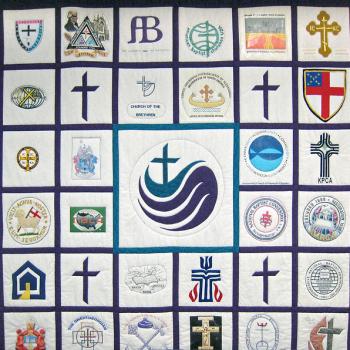We may have solved, with the help of James R. Rogers, our perennial question of why evangelicals tend to be more likely to embrace Calvinism than Lutheranism. But our other perennial question is why evangelicals, when they want something different–particularly, sacraments and liturgy–go the way of Roman Catholicism or Eastern Orthodoxy, rushing right past Lutheranism. But, applying Prof. Rogers’ approach, I think I am starting to understand.
Again, to follow Prof. Rogers, one could cite external reasons–the difficulty of “finding” Lutheranism, the innate attractiveness of joining the biggest church that extends all over the world, the beauty of Orthodox liturgy, etc.–but, on a deeper level, there is much in Catholicism and Orthodoxy that already resonates with the mindset of many evangelicals.
Evangelicals tend to be moralistic, so here are theologies which validate that moralism. Evangelicals, especially those of an Arminian bent, love the idea of synergism–that they co-operate with God in their salvation–and that they have a free will when it comes to spiritual things. I have always marveled at just how “Catholic” many evangelicals sound when it comes to salvation–including those that most abominate liturgy and the sacraments as being “Catholic”–but I can see how some might come to embrace a theology that gives such an important place to their “good works.”
It has also seemed to me that Lutherans have a higher view of the sacraments than most Catholics and Orthodox. In traditional Catholicism, baptism cleanses us from original sin, but after that we have to use the penitential system (confession, penance, absolution) in order to have our sins forgiven, though even then we must endure the temporal punishment of Purgatory unless indulgences are duly acquired. For Lutherans, baptism “measures all our days” (in the words of 17th century Anglican George Herbert), so that when we sin and fall away, we can “return to our Baptism” by faith in the work of Christ, with the help of confession and absolution (no acts of penance), hearing God’s Word of Law and Gospel, and receiving the Lord’s Supper.
On the Lord’s Supper, most attention focuses on the mode of Christ’s presence, but the main point for Lutherans has to do with its benefits. When we receive Christ’s body and blood, we receive what His body and blood won for us, namely, the forgiveness of sins and unity with Him. Our view of Christ’s true bodily presence has its nuances, but it is little different from what the Catholics and the Orthodox believe. But traditional Catholicism understands the sacrament in terms of the priest offering up Christ as a sacrifice, something we do in order to build up our merit. Taking Holy Communion in a state of sin is dangerous to the soul, requiring confession, penance, and absolution as well as fasting and other mortification in order to receive the Sacrament safely. For Lutherans, Christ is not only present but He is powerfully active; the Sacrament is precisely for sinners; it does not give us merit, but applies to us the merits of Christ; the emphasis is not on what communicants do, but what they receive.
I’m not sure where the Orthodox understanding of Baptism and Holy Communion fits in with all of this. (Perhaps someone could enlighten me.) But my impression is the Sacraments in these traditions are something that we do for our spiritual merit and that they emphasize good works more than the forgiveness of sins as the essence of the Christian life. (I do not intend here to criticize any of these traditions, including evangelicalism and Calvinism. I am open to correction about my observations.)
We might generalize that evangelicals of an Arminian mindset would be most attracted to Catholicism or Orthodoxy. Evangelicals who see the value of monergism, that God accomplishes everything for salvation (as Lutherans also do), would be most attracted to Calvinism.
Where do Calvinists go when they want something different? Well, isn’t it true that the evangelicals who do become Lutherans tend to come from Calvinism? (Again, correct me if I’m wrong.)
Where do Lutherans go? When the Lutheran synthesis breaks up, some become evangelicals and some become Catholics or Orthodox.
Does this account for everything? Help me out here.
















